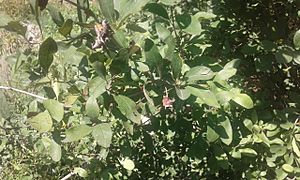Stern's medlar facts for kids
Quick facts for kids Stern's medlar |
|
|---|---|
 |
|
| Conservation status | |
| Scientific classification | |
| Genus: |
Mespilus
|
| Species: |
canescens
|
The Mespilus canescens, also known as Stern's medlar, is a special kind of large shrub or small tree. It was found not too long ago in Prairie County, Arkansas, in the United States. Scientists officially named it in 1990.
This plant is very rare and is considered critically endangered. This means it's in danger of disappearing forever. There are only about 25 of these plants known in the world. They all grow in one small forest area, which is now a protected place called the Konecny Grove Natural Area. This area is about 9 hectares big.
About Stern's Medlar
Its Plant Family
Scientists have studied Stern's medlar closely. They looked at its genes to understand its family tree. They found that it is closely related to the common medlar, which is called Mespilus germanica. Before Stern's medlar was found, the common medlar was the only known plant in its group, called the Mespilus genus.
Later studies looked even deeper into the plant's genes. These studies suggest that Stern's medlar might be a mix of plants. It could be a hybrid between the common medlar (M. germanica) and one or two types of native North American hawthorn plants (from the Crataegus group).
What Stern's Medlar Looks Like
Stern's medlar has a few interesting features:
- Thorns: It has some thorns, but not many. They are about 2 to 3 cm (about 1 in) long.
- Leaves: The leaves are fairly small. They are usually about 2 to 4 cm (about 1 to 1.5 in) long.
- Flowers: In the late spring, the plant grows white flowers. Each flower has five petals.
- Fruit: The fruit of Stern's medlar is almost round. It is about 8 to 12 mm (about 0.3 to 0.5 in) across. A cool fact about its fruit is that when it's ripe, it turns a shiny, deep red color. This is different from the common medlar, whose fruit turns brown when ripe.


